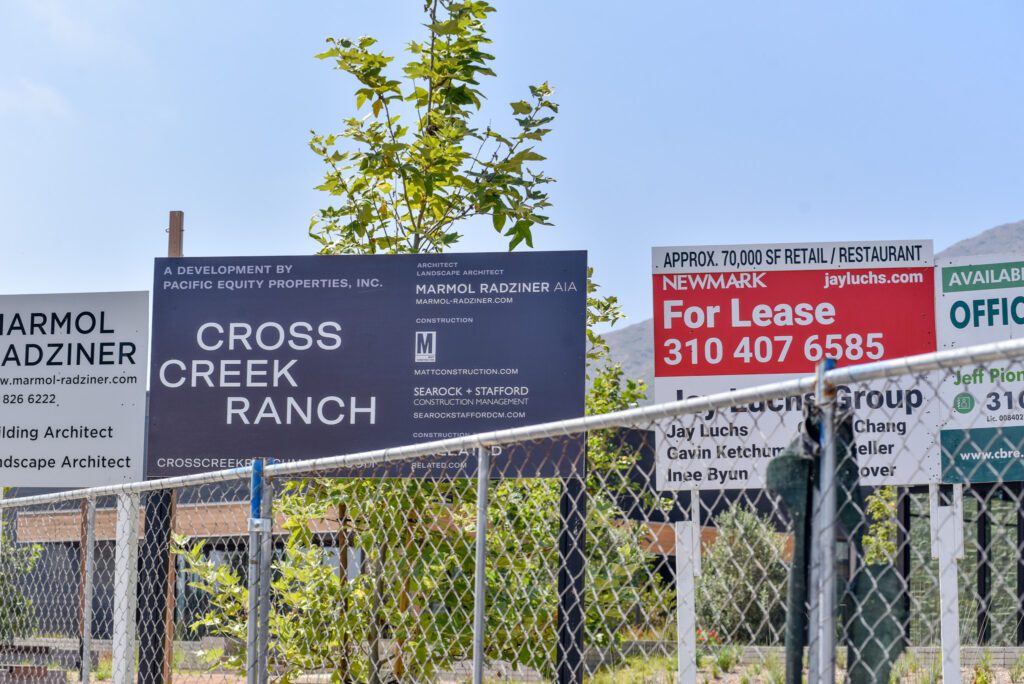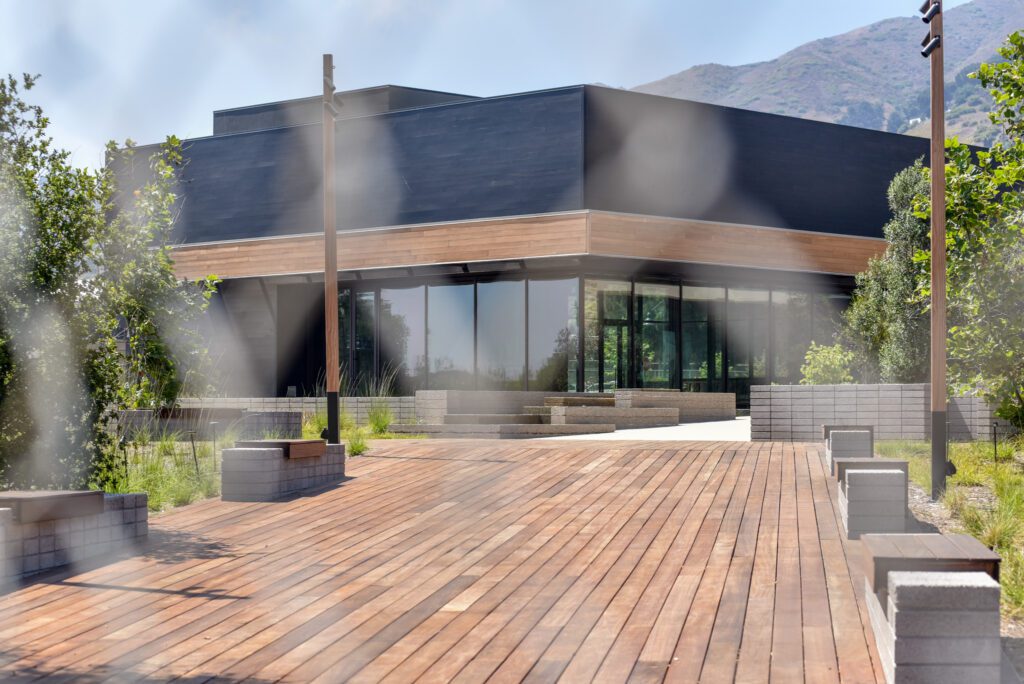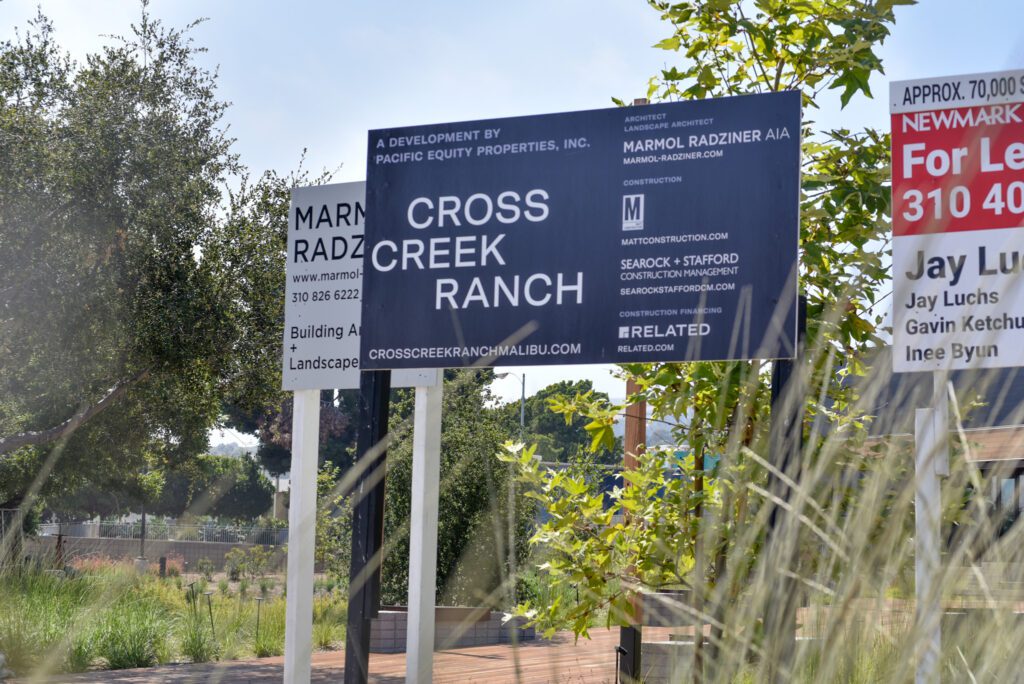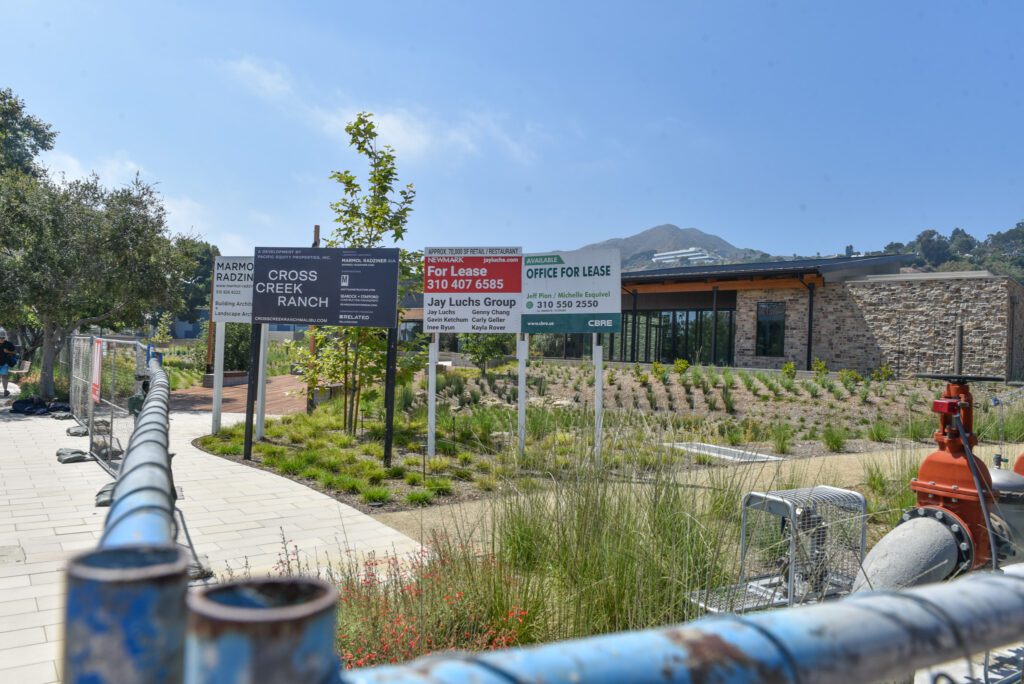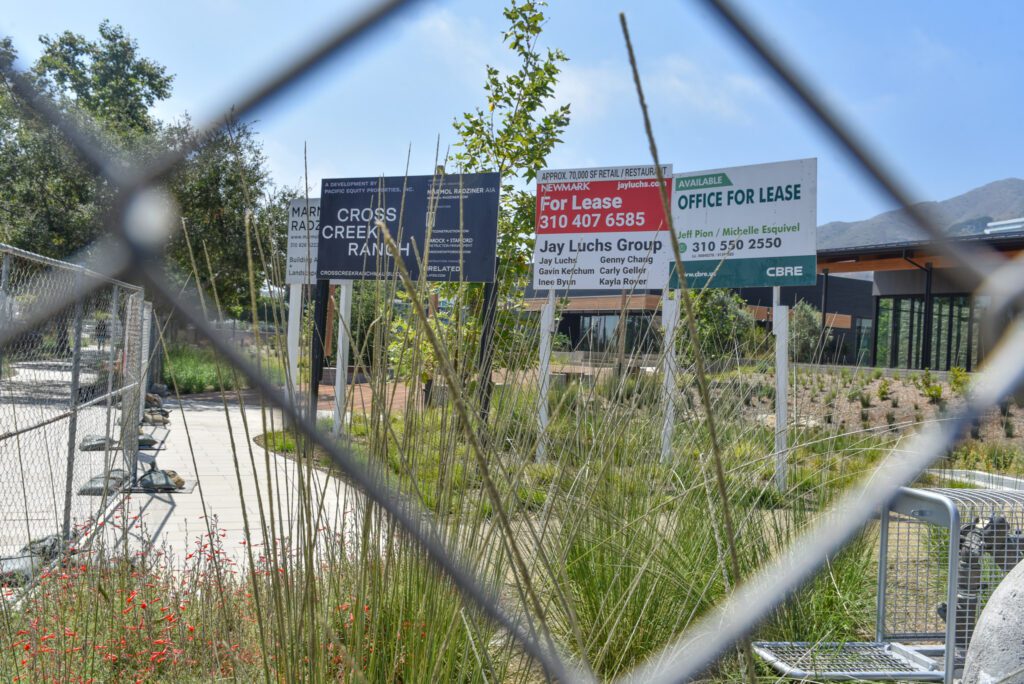
Prolonged negotiations conclude with agreement, clearing the path for development of empty retail center
By Barbara Burke
Special to The Malibu Times
It was one of those moments inherent in local politics when those whom Malibuites elected to represent them had to make a tough call.
Avoiding costly and protracted litigation, on Aug. 14th, the Malibu City Council voted 4-1 to approve a settlement agreement with Cross Creek Ranch Malibu, LLC, (CCRM) successor in interest to Malibu Development Company, LLC. regarding the large, constructed, empty, but tenant-ready retail center located on Civic Center Way between the Malibu Library and The Park at Cross Creek. The project is now known as The Ranch at Cross Creek.
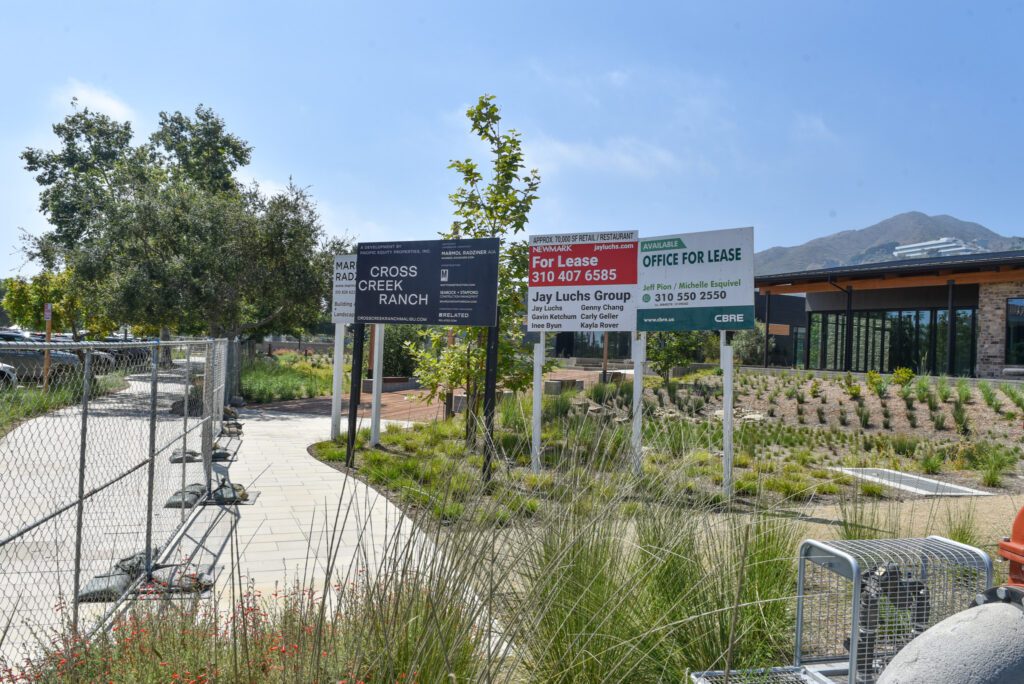
Readers may wish to grab a cup of Joe because the backstory leading up to the dispute and settlement is a little dense.
History of Cross Creek Ranch, formerly La Paz Retail Center
The relationship between the city and CCRM dates back 15 years. In 2008, a prior City Council approved a development agreement concerning the property located at 23465 Civic Center Way, where the original developer, La Paz, was granted the right to build a proposed commercial retail, restaurant, and business development project in exchange for providing a number of public benefits, including (1) conveying 2.3 acres in the city’s civic center (Parcel C), (2) a $500,000 payment to the city, (3) a pedestrian and bike path through the project connecting to Civic Center Way, and (4) dedication of a trail segment from Civic Center Way.
In exchange for receiving those benefits, the city gave CCRM, per Government Code 65864, et. seq. and the Development Agreement, the right to build its project pursuant to “the City’s official policies, ordinances, rules and regulations in force as of the date the ordinance approving the Development Agreement was approved by the City Council.”
Therefore, so long as the Development Agreement was in effect, the project was exempted from the city’s Formula Retail Ordinance, a provision that went into effect in 2018, which aimed to avoid having too many chain stores in Malibu so as to honor the city’s mission statement of preserving Malibu’s rural character.
The dispute between the city and CCRM
The Coastal Commission approved the Development Agreement in 2010. Due to litigation-related delays, the agreement’s original 10-year term was extended to Dec. 20, 2020.
The Development Agreement provides for “tolling,” meaning extending the agreement “during the time the Project is pending before the Coastal Commission,” as well as “during any period of time,” designated a “moratorium,” which is defined as existing “(1) during the period that any action or inaction by the City or other public agency that regulates land use, development or the provisions of services to the land prevents, prohibits or delays the use of the approval or the construction of the Project, or (2) during the period any lawsuit is pending brought by any third party concerning the agreement, any of the Project Approvals, including pursuant to CEQA, or any subsequent approval.”
After construction commenced, there were delays. CCRM maintains that the project was delayed while certain approvals and clearances were obtained, including what Interim City Attorney Trevor Rusin characterized in his written summary for the Council as “a significant delay addressing a Caltrans issue in which Caltrans and the City disagreed over the manner of widening a portion of Pacific Coast Highway at Cross Creek Road.”
CCRM maintained it was entitled to an agreement extension of approximately seven years, in which case the Development Agreement would expire in December 2027. Whereas, the city disagreed and asserted any delay of the agreement was significantly less. Absent the settlement of the parties’ dispute, the Development Agreement would have expired on Dec. 30, 2023.
Details of the settlement
After conducting three closed-session negotiations, the City Council considered whether to approve the parties’ proposed settlement in its open meeting on Aug. 14 to allow for public comment.
Rusin stated, “Rather than litigating the dispute, the City and CCRM proposed ‘a good-faith compromise’ that provides additional tolling, but only for a portion of the period of time sought by CCRM — while also narrowing the rights of CCRM during that additional tolling period, and providing significant benefits to the City.” Under the Settlement Agreement, the Development Agreement will be tolled and will expire on Aug. 14, 2024, one year after the parties consented to settlement.
Settlement’s benefits to the city
The salient provisions of the settlement include that Parcel C, located directly behind the Ranch shopping center, will no longer revert to CCRM.
Rusin noted that under the original Development Agreement, Parcel C was to be reconveyed to CCRM in certain circumstances, including if the city does not develop the property in the next six and a half years. Under the Settlement Agreement, CCRM waives that right, allowing the city to develop the parcel on a time frame that fits its priorities without risking its right to the property.
Further, the parties’ settlement expands the city’s possible uses of Parcel C such that the city could construct: 1) a municipal auditorium or community performing arts center; 2) an art gallery or exhibition space; 3) a movie theater; 4) sports or recreation facilities with appropriate sound attenuation to accommodate neighbors; or 5) “any other use that does not substantially negatively impact the operations, peacefulness, or economic health of Cross Creek Ranch in CCRM’s reasonable business judgment, which shall not be unreasonably withheld.”
The city will also receive free parking for Parcel C at Cross Creek Ranch to provide up to half of the city’s future parking needs post-development, as well as up to $100,000 for planning and design services to help the city develop Parcel C.
Further, CCRM will pay the city $250,000 in five equal annual installments, beginning 30 days after the first tenant opens to the public. Finally, CCRM agreed to pay the city $40,000 for negotiation-related legal expenses and costs.
Benefits to CCRM and its subjection to the new Formula Retail Ordinance
For its part, CCRM will continue “to be entitled to expedited processing of permitting applications” during the term of the Development Agreement, but “will not be eligible for additional tolling.”
The gravamen of the settlement focuses on when CCRM becomes subject to the Formula Retail Ordinance, the 2018 law that imposes limitations on shopping centers of more than 10,000 square feet and prohibits chain stores with 10 or more global locations from renting in those malls “to avoid a sense of sameness and familiarity,” in the Malibu retail sector.
After the Development Agreement expires in August 2024, CCRM will be subject to the Formula Retail Ordinance. However, the settlement provides that until then, CCRM may obtain a planning clearance for nonexempt formula retail tenants for both types of Retail Formula exempt companies – not only for up to 30 percent of the shopping center’s gross floor area as allowed by the Formula Retail Ordinance (30 percent provision in that law), but also for an additional 20 percent of the gross floor area (20 percent of square footage limitation, excluding floor area occupied by exempt formula retail).
To keep things straight, CCRM has agreed to designate for each proposed tenant whether the permit application is to be reviewed as a 20 percent or 30 percent type.
There are further nuances in the settlement agreement. First, retail tenants with 10 or more stores anywhere in Los Angeles, Ventura, and Orange counties do not qualify for a planning clearance as part of the 20 percent type. As a result, while the 20 percent type would qualify as “formula retail” under that ordinance based on the presence of 10 or more stores in the world, stores approved in this situation as part of the 20 percent type will not have a large presence in those counties.
Further, CCRM may lease up to three non-exempt formula retail tenants with a space up to 5,000 square feet in size, compared to the Retail Formula Ordinance’s 4,000-square foot limitation.
Although stores who obtain permission to lease under the Settlement Agreement’s relaxed Retail Ordinance provision will be able to continue as tenants, after their tenancy expires, new tenants will be subject to the law.
The council’s deliberations in open session
The councilmembers struggled regarding whether to approve the settlement agreement, which was only added to the Aug. 14 agenda on Aug. 11 without providing the original Development Agreement as part of the amended city council agenda materials.
Citizens who commented included John Mazza, who stated, “This settlement agreement is disadvantageous to other retailers in other malls, such as Howdy’s, and you’re giving an advantage to one retail center to the detriment of local businesses. We need to remember that Malibu residents want a rural environment.”
Jo Drummond stated, “If there is a lot of large retail in the shopping center, the landlord can raise the rent, which will affect other local retailers and that doesn’t serve the local community.”
Complicating the consideration of the settlement agreement further, the council focused on the terms of the proposed release of any claims, known or unknown that CCRM may ever have against the city.
Commenting on the “awkwardness,” of modifying a release provision in an agreement in an open forum in front of the very parties the city is negotiating with, Silverstein said he was uncomfortable with agreeing to the settlement agreement in the meeting.
Ultimately, the parties agreed to a more expansive release provision. Silverstein, the only attorney on the council, voted against approving the settlement and urged deferring consideration of the settlement agreement. Essentially, Silverstein argued that if he had a little extra time, he was confident that he and his colleagues could negotiate an even better settlement of the dispute. Specifically, Silverstein remarked that he thought the city could get more benefits from the developer and that all restrictions on what the city does with Parcel C should be removed.
“We wouldn’t be considering settlement unless the developer had a claim that it is entitled to tolling,” He said. “They have a claim. Only litigation would resolve which party would win with regard to their position concerning the length of tolling the developer is entitled to.”
Other councilmembers favored approving the settlement agreement, including Councilmember Paul Grisanti.
Colloquially applying principles of fundamental fairness that translate into the “deal is a deal,” theory, Councilmember Doug Stewart advocated accepting the settlement agreement as modified in open meeting, stating that in good faith the city needed to agree to the deal.
The proposal to approve the amended settlement agreement passed 4-1. Silverstein voted no, stating that amending an agreement in session was repugnant to his inclinations as an attorney.
Status of the Ranch Project going forward
Given that the settlement has been reached, readers may wonder what will happen next to the empty retail center, a la “Well settle-schmettle, now when exactly will the retail center open and with what retail, restaurant, and office tenants.”
“We are now in the position that we can now go ahead with the tenants starting their leasing process,” Ranch’s CEO Bryan Gordon. “We’ve been waiting for the settlement agreement and some tenants have started applying for building permits.”
However, Gordon stated that he wanted to manage readers’ expectations regarding the timing of business openings.
“We anticipate that we will now open in the summer of 2024 because it takes time for tenants to go through the permitting process,” he said. “First, they must go through planning clearance and planning approval, then they must obtain conditional use permits if they are required, which is generally for restaurants, then they have to obtain approval of their plans, do buildouts, and final walk-throughs. Finally, they must obtain a certificate of occupancy.”
The long and short of the matter is that the dispute has been settled and the businesses interested in leasing in the space now must start the permitting process. In the meantime the community waits and wonders.
